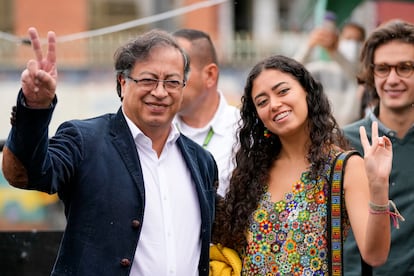Sofía Petro: ‘Sexist violence permeates the government’
The daughter of Colombian President Gustavo Petro, a declared feminist, maintains that some bad decisions overshadow the executive’s efforts to advance public policies with a gender focus


When Sofía Petro Alcocer (Bogotá, 22 years old) lands in Colombia, she is surrounded by a dozen bodyguards. The carefree life of a student that she has been living for five years in France, where she is studying a postgraduate degree in public policy, is put on hold during the holidays for family visits. She takes advantage of the opportunity to meet up with her friends in a café in Bogotá and to look for the few free spaces left by the presidency to spend time with her father, Gustavo Petro. When the Casa de Nariño, the official presidential residence, is empty, she takes care of the two dogs, Filipe and Tequila. She takes them with her to a café in Teusaquillo, a traditional and bohemian area of the city, to talk to EL PAÍS in the first interview she has given about her father’s government.
In recent weeks, many feminist sectors have questioned some of the appointments of the first left-wing president in contemporary Colombia: sexist, misogynistic men, or men with a history of gender violence. A declared feminist, one of the president’s daughters begins the conversation by pointing out that her father is in the process of deconstruction, but clarifies that there are gender issues that he, at 64 years old, will no longer learn about. Although she is not part of the government nor has any responsibility for Petro’s decisions, her positions are, perhaps, those that the president hears most in his inner circle, away from the ears of other politicians. Although she tries to stay out of politics, Sofía says that she does not hold back on criticism: “I’m the first to take him to task on a lot of things.”

Question. The president has been criticized by various feminist sectors for having sought to appoint Daniel Mendoza as ambassador to Thailand, or Armando Benedetti as his presidential advisor. What is your opinion on this tendency to hand power to men accused of misogyny or gender violence?
Answer. I agree with feminist groups and women’s organizations in their criticism of multiple appointments. I believe that these decisions overshadow the major processes that the government has been carrying out from different entities, where a number of technical gender teams are fighting significant battles inside and outside. Machismo permeates the whole of society, including the institutions.
Q. What did you think when you heard news of Mendoza’s appointment?
A. I totally agree with the criticism, I fully understand the complaint about the old tweets he posted. I also reviewed his defense, that it was characters from his books speaking in the tweets. That may be possible, but we have no way of guessing whether he supports those phrases or not. That lack of clarity is enough. It is only fair that he has not been appointed. Regarding my father, in his last speech on Mendoza’s defense, I don’t think he communicated what he wanted to say well. He sparked controversy for something that, I am sure, he does not believe. For example, that love is comparable to violence against women, which was what was implied. He hadn’t read those tweets [by Mendoza] when he made that reference to this politics of love.
Q. Besides that case, has there been any other appointment that has caused a stir? Benedetti, Hollman Morris, Andrés Hernández, Diego Cancino?
A. All of them. I agree with the criticism of all these appointments.
Q. Have you made that known to the president? To what extent can you communicate your concerns to him?
A. Our chat is full. We have very wide-ranging discussions on these issues. For example, when gender parity was broken in his cabinet, I was the first one to tell him, “Hey, I have you in my sights.” He laughed. On that occasion, he told me that it was only by one person, but I told him: ‘No, you can’t do that.’ He always answers me and tries to explain why he does things this way or that way. He is learning from those mistakes. I know that many people will be disappointed because they would like him to be clear about many things that we, in this generation, are aware of. The truth is that there are many things he has learned, many things he has not learned, and many things he probably will not learn.
Q. Does Petro listen to you?
A. Sometimes, sometimes... other times he is very man-like. I’m lucky to be able to text the president and make my complaints directly, without having to resort to Twitter [now X]. He’s quite clear about the criticisms I make of him because I’m the one who faces his stubbornness the most. And if sometimes it tries my patience, I can’t imagine what it must be like for everyone else.
***
Sofía’s discourse about women is perhaps the strictest view of feminism in President Petro’s family. Cautious with her words, she says she stayed away from debates on social media to make it clear that she has no responsibility for the decisions, good or bad, that her father makes in government. She leans back in her chair in the middle of the conversation and reaffirms: “I find out about many things and I write to my dad about them when I feel there is something important. But the rest, I take in on my own and think, what decision would I make in his place?”
Q. What do you think the president has learned? What does he still need to learn?
A. He understands that the slogan ‘change is with women’ is not just a campaign phrase. He really takes them into account in his programs and knows that they were central to his election. He has learned a lot about popular feminism. I think what’s most difficult for him is to remove some gender stereotypes from his speech. For example, he insists that land should be given to women because they will take better care of it, because naturally they would do that because of their gender. I think that’s a mistake.
Q. Regarding his choice of phrase, just a few months ago the president referred to some journalists as “mafia puppets...”
A. That was horrible, it was a terrible communication error. Above all because it referred to very specific people, but even referring to them, even if there were some relationship between journalism and the mafia, I think that this qualification is absolutely unnecessary. He communicates poorly. He gets into some super unnecessary messes all by himself. There is a lot to improve in his discourse. Now, when I say ‘errors’ I don’t want to minimize it or say that it is specific, because it is not specific, it is systematic. Sexist violence permeates the government.

Q. Do you think that Petro has failed the sector of women who elected him?
A. I think that to a large extent, yes, because of these big blunders, like these appointments. Now, I think that there are also a series of processes that are being carried out by all the ministries to transform the institutionality. There is a very tough gender team in the Ministry of the Interior that has legislative influence and has supported projects such as the one that prohibits female genital mutilation, the comprehensive trans law, or the one that was recently approved on the prohibition of child marriage.
Q. Do you see other successes in gender issues?
A. I think that the Salvia system for preventing gender-based violence, by the Ministry of Equality, is a great success. Also, the adoption of the UN resolution on Women, Peace and Security, to guarantee the participation of women in peace processes. Paths have been opened on many fronts that we must recognize so that other governments are no less willing to address women’s demands.
Q. How would you describe the media coverage of your mother, Verónica Alcocer? Do you think it has been misogynistic?
A. I think she has been under a lot more scrutiny because she is a woman with a strong voice. She carries a lot of strength with her. I’m talking about my mother, I don’t know how objective I’m going to be, but I think that’s why she has experienced a lot more criticism and more scrutiny, from outside the government and even from within. I think the media and society have been misogynistic towards her.
***
Sofía does not mince words when talking about her mother and firmly reiterates that although she and her sister Antonella have also experienced fierce machismo on social media, her mother has put a kind of shield over the family. “There are many battles she has fought on her own, without recognition and without being in front of all the cameras. Without receiving applause, but she does it, I know that, and I thank her for it,” she says in a low voice, and then smiles.
Q. The Ombudsperson Iris Marín has been very critical of the government on gender issues. What do you think of voices like hers in institutions?
A. I think it’s very good. I think it shows the democratic nature of the government, capable of appointing a person who will publicly contradict or oppose certain decisions.
Q. A year and a half before the presidential elections, several women are seeking to appear on the ballot for right-wing forces, such as María Fernanda Cabal, Paloma Valencia, or Vicky Dávila. Would a possible victory for them be a step forward for feminism?
A. They are certainly strong women. I’m entering into a shady area, but they are opening up important spaces in their own sectors. Ten years ago, it was unimaginable that a woman would represent the Democratic Center. Although I have no affinity with those political sectors, they are victories. There is something valuable about the fact that it is normalized that a woman can represent any sector. Now, what I do feel is that they do not necessarily defend the rights of all women, but I think they are strong. I think it’s very good that there are so many women in an electoral contest.
Q. Do you see any women with presidential possibilities in progressivism?
A. Of course, but I won’t name names. Many women in the movement have fought hard and are very valuable. I hope some of them will make it.
Q. Do you see María José Pizarro or Susana Muhamad there?
A. I prefer not to talk about that.
Q. Have you thought about going into politics in the future?
A. I study political science and I am very passionate about the country’s political processes, but I know that politics is also outside of elections and representative positions. There are whirlwinds that come every time I come to Colombia. I will certainly be involved in politics, but from other scenarios. I don’t see myself in any representative position. God forbid.
Sign up for our weekly newsletter to get more English-language news coverage from EL PAÍS USA Edition
Tu suscripción se está usando en otro dispositivo
¿Quieres añadir otro usuario a tu suscripción?
Si continúas leyendo en este dispositivo, no se podrá leer en el otro.
FlechaTu suscripción se está usando en otro dispositivo y solo puedes acceder a EL PAÍS desde un dispositivo a la vez.
Si quieres compartir tu cuenta, cambia tu suscripción a la modalidad Premium, así podrás añadir otro usuario. Cada uno accederá con su propia cuenta de email, lo que os permitirá personalizar vuestra experiencia en EL PAÍS.
¿Tienes una suscripción de empresa? Accede aquí para contratar más cuentas.
En el caso de no saber quién está usando tu cuenta, te recomendamos cambiar tu contraseña aquí.
Si decides continuar compartiendo tu cuenta, este mensaje se mostrará en tu dispositivo y en el de la otra persona que está usando tu cuenta de forma indefinida, afectando a tu experiencia de lectura. Puedes consultar aquí los términos y condiciones de la suscripción digital.








































